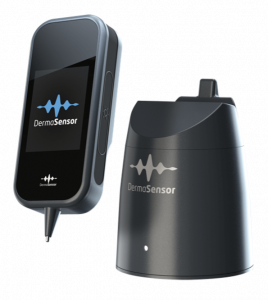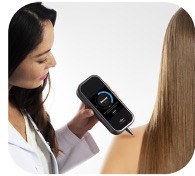
The DermaSensor device is an affordable, handheld device that uses machine learning and spectroscopy to test skin lesions for cancer at the point of care.

MIAMI, FLORIDA, USA, July 7, 2022 /EINPresswire.com/ -- DermaSensor Inc., a health technology company designing non-invasive tools to better equip primary care physicians (PCPs) to detect skin cancer, today announces the PATIENT-SELECT study results at the American Dermoscopy Meeting in St. George, Utah. The device was found to have a sensitivity for detecting skin cancer of 90.0% and a Negative Predictive Value (NPV) of 98.9%. By comparison, PCPs’ sensitivity for detecting skin cancer was only 40.0% in the study.
The DermaSensor device and its spectroscopy technology, comprised of Elastic Scattering Spectroscopy (ESS) and artificial intelligence (AI), was awarded Breakthrough Device Designation by the FDA in 2021. This handheld device is designed to evaluate skin lesions at the point of care by taking five painless, non-invasive, ~1 mm optical tissue samples of the lesion, immediately assessing cellular and subcellular characteristics to determine if there may be malignant features. To date, DermaSensor has completed, or collaborated with investigators on, nine clinical studies, six of which have already been published or accepted for publication. Seven of these studies were algorithm development and validation studies which all found sensitivity for skin cancer of at least 90%, and two of these studies were clinical utility studies which both showed the device improves PCPs’ detection of skin cancer.
PATIENT-SELECT was a prospective, blinded validation study which consisted of PCPs using the device to scan any lesions that were concerning for cancer to the patient, regardless of the PCPs’ clinical suspicion. Gold standard comparison for performance of the device and PCPs was biopsy results when available, and a three-dermatologist expert panel review of dermoscopic and clinical images when pathology was unavailable. After clinical evaluation, PCPs reported their diagnosis, management decision (e.g. refer, biopsy), and confidence level, which provided the physician comparison data. A total of 156 patients with 178 lesions were evaluated in the study. The diagnostic sensitivity of the device was 90.0% with a Negative Predictive Value (NPV) of 98.9%. when compared to the biopsy results or, when unavailable, the dermatologist panel consensus. The device’s specificity was 60.7% for correctly ruling out benign lesions, with a specificity of 76.9% for pigmented lesions and 70.2% for seborrheic keratoses. When comparing whether the device made the correct management decision regarding the referral of high-risk lesions to dermatology, there was 88.2% concordance with the dermatologist panel. There was no impact of race or skin type on sensitivity nor specificity of the device.
“As a dermatologist panelist who reviewed every lesion in this study, I found that the lesions were a great representation of the ones often of concern to both patients and PCPs. Not only was the optical spectroscopy technology effective in ruling out benign lesions, but it also detected nearly all the skin cancers.” states Dr. Nathalie Zeitouni, Mohs surgeon at Medical Dermatology Specialists and Professor of Dermatology at University of Arizona COM Phoenix, senior author of this publication. “The results of this study suggest this device will be valuable to PCPs in detecting more skin cancer and appropriately referring those cancerous lesions to dermatologists for us to biopsy and treat.”
DermaSensor Inc. is a health technology company designing non-invasive tools to better equip primary care providers for skin cancer detection. The DermaSensor device is an affordable, handheld tool that uses machine learning and spectroscopy to evaluate skin lesions for potential cancer in a matter of seconds. DermaSensor’s mission is to improve outcomes and save on healthcare costs by providing broad access to effective skin cancer checks since most Americans do not receive an annual skin exam. The DermaSensor device is currently CE Marked and it is registered and available for sale in Australia and New Zealand. It is currently an experimental device limited to investigational use in the United States and is not available for U.S. sale.
Marc Acton
Alpha Echo Agency, LLC
+1 615-267-8450
email us here
Visit us on social media:
Facebook
Twitter
LinkedIn

